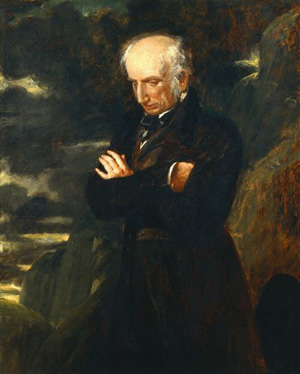The River Derwent
William Wordsworth
Was it for this
That one, the fairest of all rivers, loved
To blend his murmurs with my nurse's song,
And from his alder shades and rocky falls,
And from his fords and shallows sent a voice
That flowed along my dreams? For this didst thou,
O Derwent! winding among grassy holms
Where I was looking on, a babe in arms,
Make ceaseless music that composed my thoughts
To more than infant softness, giving me,
Amid the fretful dwellings of mankind,
A foretaste, a dim earnest, of the calm
That Nature breathes among the hills and groves.
When he had left the mountains and received
On his smooth breast the shadow of those towers
That yet sumve, a shattered monument
Of feudal sway, the bright blue river passed
Along the margin of our terrace walk;
A tempting playmate whom we dearly loved.
O, many a time have I, a five-years' child,
In a small mill-race, severed from his stream
Made one long bathing of a summer's day;
Basked in the sun, and plunged and basked again
Alternate, all a summer's day, or scoured
The sandy fields, leaping through flowery groves
Of yellow ragwort; or when rock and hill,
The woods, and distant Skiddaw's lofty height,
Were bronzed with deepest radiance, stood alone
Beneath the sky, as if I had been born
On Indian plains, and from my mother's hut
Had run abroad in wantonness, to sport,
A naked savage, in the thunder-shower.
William Wordsworth was born and grew up in Cockermouth on the River Derwent.
